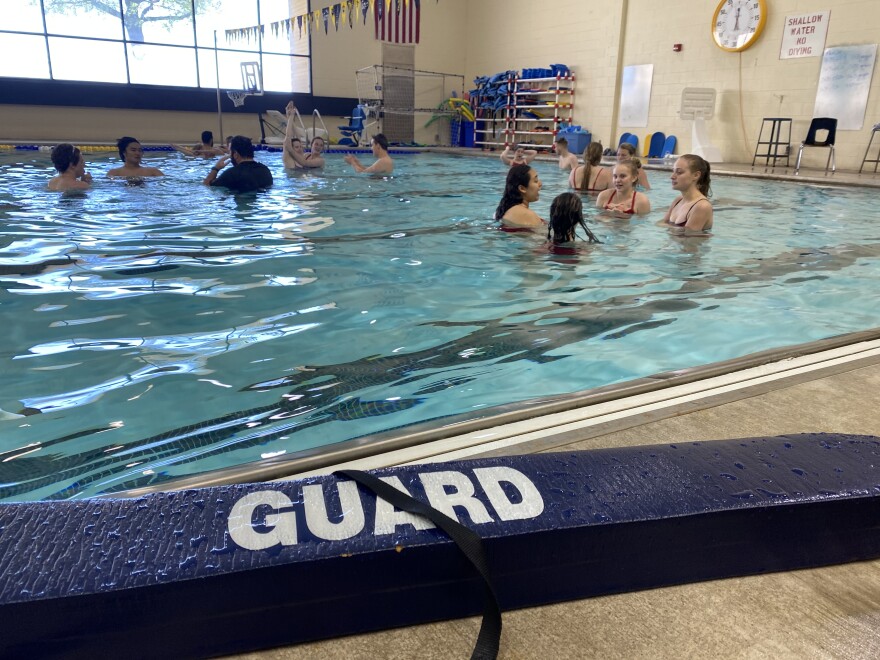During a normal year, Brian Hill doesn’t have much trouble hiring enough lifeguards to staff Wichita’s public swimming pools.
But this isn’t a normal year.
“Usually I’m about 80 percent staffed by February,” said Hill, aquatics director for the city of Wichita. “This year, I was about 10 percent staffed.”

Lifeguarding took a hit last summer, as the COVID-19 pandemic closed most gyms, water parks and community pools. High school and college students who would normally work as guards took the summer off or found other jobs. Training classes were cancelled, and so was the city’s Junior Lifeguard program for 11- to 14-year-olds.
“That’s our pipeline,” Hill said. “In a lot of ways we were kind of starting this summer from scratch.”
But swimming pools, beaches and water parks are back — and so are the teams of lifeguards that are crucial to keep them open and safe.
Wichita public pools open on Memorial Day. Hill and other pool managers have been hard at work over the past several weeks training, testing and hiring lifeguards.
Twenty-year-old Alanis Balza Medina started lifeguarding when she was 16.
“It’s my go-to summer job,” said Balza Medina, who is pursuing a degree in elementary education at Emporia State University. “This is the job that I enjoy and (that) gives me a lot of training for my future. ... And it’s a great work environment to be in as well.”
She swam at Wichita’s Harvest Pool as a young child and remembers admiring the lifeguards and appreciating how friendly they were. She started lifeguarding at Wichita’s Evergreen Pool and worked her way up to the head guard position. Now she manages Orchard Pool and trains guards throughout the summer.
“It’s a tough job sometimes. However, when it’s just the guards, it’s a community — basically a family — that you become, because you’re always with these people,” Balza Medina said.
“You have to learn to work as a team and make sure you can function together as a whole. Because if you don’t, there’s someone’s life in danger.”
To be a lifeguard in Wichita, you have to be at least 15, complete a three-day training session and pass a certification test. Guards learn to prevent, recognize and respond to a variety of emergencies in and around the water. They also learn first aid and CPR.
Talk to any longtime lifeguard, and you’ll hear stories about life-saving rescues. Balza Medina recalls an incident in 2018, when a young girl fell off the side of an elevated diving board and had to be treated on site and taken to the hospital.
“That was probably the scariest situation that I’ve had,” Balza Medina said. “It’s not something that people necessarily think about, but we go through very extensive training to be prepared to protect our patrons.”

Sam Cortes was only 15 and a first-year guard at Minisa Pool when he performed his first save. During a pool party that summer, a young child fell into the deep end. His father panicked and jumped in after him. Neither one could swim.
“So my very first save was a double rescue,” said Cortes, who trains guards and manages the aquatics program at McConnell Air Force Base.
“It was all adrenaline, because like I tell people: It goes back to our training,” he said.
“You’re only as good as your training, so in any emergency you go back to what you’ve trained for.”

During a recent certification class at Northwest High School, Hill and Cortes demonstrated a series of shallow- and deep-water rescues. About a dozen teens and young adults paired up and ran through drills, playing victim or rescuer.
There’s lots of laughter amid the splashing and whistles. But the trainers emphasize the critical responsibility that comes with the job.
“It’s definitely a challenge to make sure that we bridge the gap of, ‘Hey, this is a fun summer job,'" Cortes said. "But you are a lifeguard. You are a professional rescuer."
Joe Hutchinson coaches swimming at Wichita’s East High School and manages Rockwood Pool, a members-only swim club near Central and Rock Road.
Rockwood, like a handful of private pools and country clubs, managed to remain open last summer despite COVID-19 restrictions. Hutchinson said that boosted his selection of applicants this year, and he ended up with a surplus of lifeguards.

Other pools had to start over with recruiting and training.
“So much of it is kids growing up going to the pool every day,” Hutchinson said. “They see their older friends who are lifeguards, and they say, ‘I want to do that next summer,’ and then they start getting ready for that job and getting certified.
“Since there wasn’t the opportunity to see your friends be lifeguards last summer, I think that new wave of lifeguards that normally fills in those empty spots just isn’t there.”
The American Lifeguard Association says lifeguard shortages are common across the country. One reason: The traditional “summer job” is more nostalgia than reality these days, as teens and young adults look for year-round work.
In addition, COVID-related travel restrictions have limited the number of seasonal college and foreign exchange students. And overall interest in lifeguarding is declining.
Hill, Wichita’s aquatics director, says he should have enough lifeguards and other staff to monitor the city’s pools and splash pads this summer. And he hopes some of the swimmers having fun this year will consider applying next summer.
“It’s a fun way to get into the professional world, learn how things go,” he said. “It’s a very important job, a very critical job.
"But I’m not going to lie, it’s also a lot of fun.”




